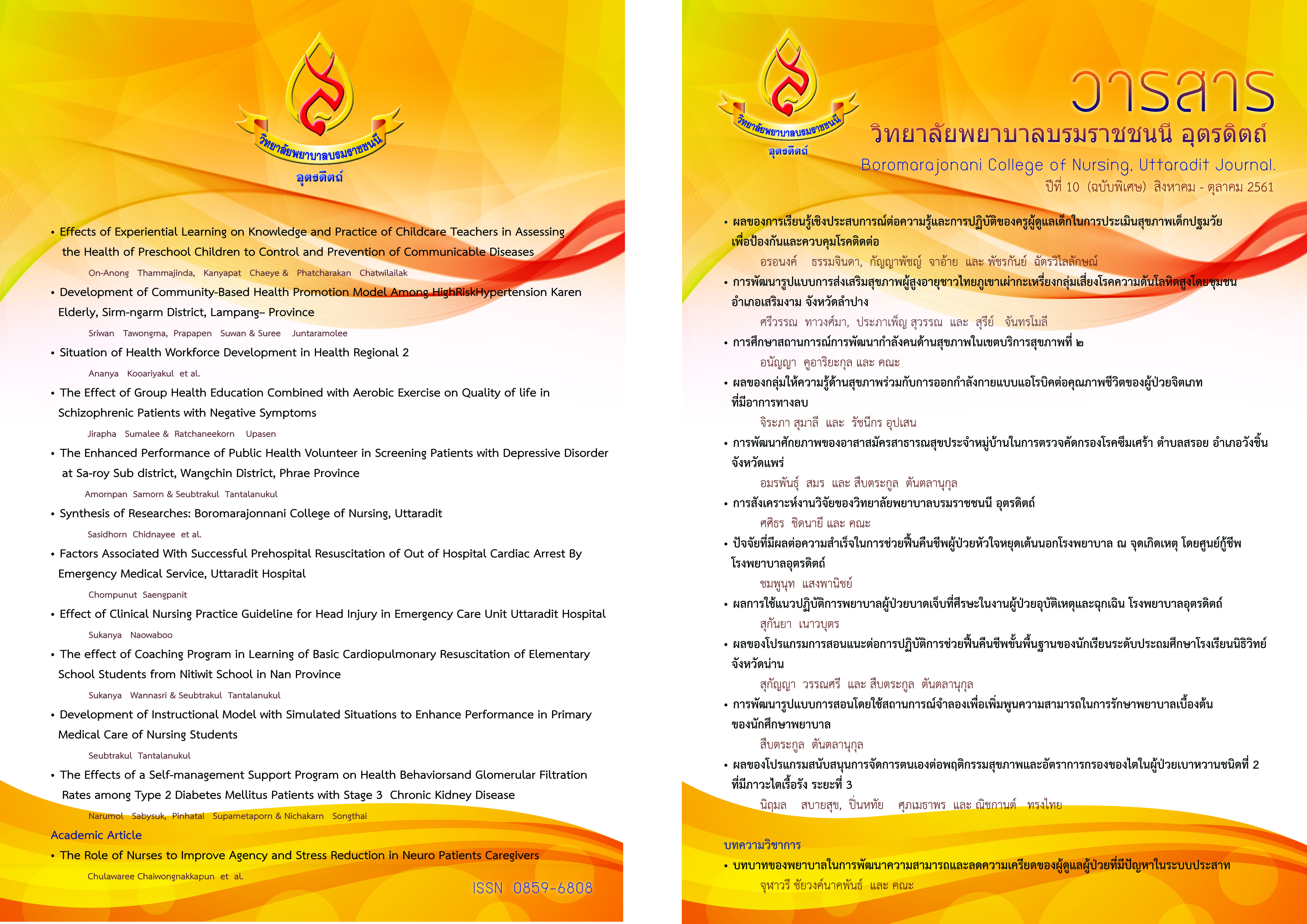บทบาทของพยาบาลในการพัฒนาความสามารถและลดความเครียดของผู้ดูแลผู้ป่วยที่มีปัญหาในระบบประสาท
Main Article Content
บทคัดย่อ
บทความนี้มีวัตถุประสงค์เพื่อนำเสนอบทบาทของพยาบาลในการพัฒนาความสามารถและลดความเครียดของผู้ดูแลผู้ป่วยที่มีปัญหาในระบบประสาทโดยนำการพยาบาลระบบสนับสนุนและให้ความรู้ตามแนวคิดของโอเร็มเป็นกรอบแนวคิด บทความมีการเสนอผลการพัฒนาความสามารถของผู้ดูแลซึ่งสมาชิกในครอบครัวหรือผู้ดูแลเป็นผู้ที่มีบทบาทสำคัญที่สุดในการดูแลผู้ป่วยที่มีปัญหาในระบบประสาทที่มีความพิการหลงเหลืออยู่หลังรอดชีวิต เนื่องจากเป็นผู้ที่ใกล้ชิดกับผู้ป่วยมากที่สุด ผู้ดูแลที่ให้การดูแลผู้ป่วยที่มีความพิการต้องทำกิจกรรมการดูแลผู้ป่วยตลอดวัน รวมทั้งต้องปฏิบัติกิจวัตรประจำวันของตนเองจึงอาจทำให้ผู้ดูแลไม่สามารถดูแลผู้ป่วยเพื่อตอบสนองความต้องการของผู้ป่วยได้อย่างครบถ้วนและยังทำให้ผู้ดูแลเกิดความเครียดที่ต้องดูแลผู้ป่วยต่อเนื่องเป็นระยะเวลานาน
Article Details
บทความหรือข้อคิดเห็นใดใดที่ปรากฏในวารสารวิจัยการพยาบาลและวิทยาศาสตร์สุขภาพ เป็นวรรณกรรมของผู้เขียน ซึ่งบรรณาธิการหรือสมาคมศิษย์เก่า ไม่จำเป็นต้องเห็นด้วย และบทความที่ได้รับการตีพิมพ์เผยแพร่ถือเป็นลิขสิทธิ์ของวารสารวิจัยการพยาบาลและวิทยาศาสตร์สุขภาพ
เอกสารอ้างอิง
2. Boonvas, K., Supanunt, T., Chunhabordee, A. & Wae, N. (2017). Caregiver stress and needs in caring disabled. The Southern College Network Journal of Nursing and Public Health, 4(1), 205-216. (in Thai)
3. Chayawato, C. (2016). Depress in the caregivers of stroke patients. Region Medical Journal, 35(1), 14-27. (in Thai)
Chunhaborde, A., Supanunt, T., Oupara, R., & Thongsai., S. (2013). Stress and needs of care givers providing care for stroke patients at home. Journal of Phrapokklao Nursing College, 24(1), 1-9. (in Thai)
4. Khiewchaum, R. , Thosingha, O., Chayaput, P., & Utriyaprasit, K. (2011). The development of a clinical nursing practice guideline for preparation of caregivers of patients with TBI (traumatic brain injury). Journal of Nursing Science, 29(1), 18-25. (in Thai)
5. Krasoal, T., Chaiwongnakapun, C. & Katewerapong, S. (2008). Effect of supportive - educative nursing system on dependent care agency among caregivers of traumatic brain injured patients and stroke patients. Journal of The Phrae Hospital, 16(1), 41-51. (in Thai)
6. Orem, D. E. (1995). Nursing: Concepts of Practice. St.Louis: Mosby.
7. Prombut, P., Piaseu, N., & Sakulhongsopon, S. (2014). Factors related to stress of family caregiver of patients with stroke at home. Ramathibodi Nursing Journal, 20(1), 82-96. (in Thai)
8. Promrat, T., Soodsang, N., Punclum, P. & Treeyawarangpunt, K. (2016). Development of application for the stress treatment in drug abuser and addict. Art and Architecture Journal Naresuan University, 7(1), 69-83. (in Thai)
9. Srisopa, P. & Asarath, T. (2017). Nursing role in preventing and managing stress. Burapha Journal of Medicine, 4(2), 79-82. (in Thai)
10. Tantalanukul, S. & Wongsawat, P. (2017). Stress and stress management in nursing students. Boromarajonani College of Nursing, Uttaradit Journal, 9(1), 81-92. (in Thai)
11. Unnaphirak, L. (2010). Nursing care, elderly, neurological problems, and more. Bangkok: Boonsiri Publishing. (in Thai)
12. Zomorodi, M. (2014). Nursing management stroke. In S. L. Lewis (Ed.), Medical-surgical nursing: Assessment and management of clinical problems (9th ed.). St Louis Misssouri: Elsevier Mosby.


